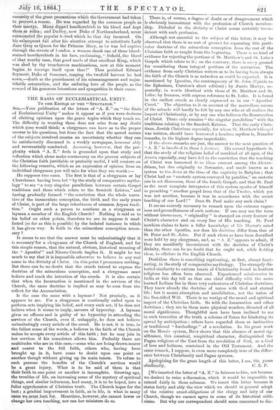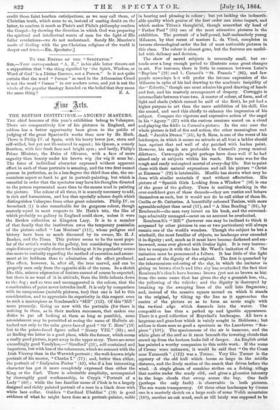THE BASIS OF ECCLESIASTICAL UNITY.
To THE EDITOR OF THE " SPECTATOR."
SIR,—Your publication of the letters of "A. Z." on "the Basis of Ecclesiastical Unity" makes it appear as if you were desirous of eliciting opinions upon the grave topics which they touch on. The difficulty iu treating these does not arise from any doubt which (one would think) a clergyman can have as to the proper answer to his questions, but from the fact that the sacred nature of the subjects involved creates an uncertainty whether they can be satisfactorily discussed in a weekly newspaper, however ably and reverentially conducted. Assuming, however, that the per- plexity which " A. Z." feels is grounded upon that study and reflection which alone make controversy on the gravest subjects of the Christian faith justifiable or probably useful, I will veqture on the following remarks, which as an expression of opinion from an individual clergyman you will take for what they are worth:— He supposes two cases. The first is that of a clergyman or lay Churchman having been led " by the study of comparative mytho- logy" to see "a very singular parallelism between certain Gospel traditions and those which relate to the Sanskrit Kristna," and having gradually formed " the conviction that the whole narra- tive of the immaculate conception, the birth, and the early years of Christ, is part of the large inheritance of common Aryan tradi- tion." Ought such a person to continue as a clergyman or layman a member of the English Church? Nothing is said as to his belief on other points, therefore we are to suppose it unaf- fected (so far as this is possible) by the isolated instance in which it has given way. Is faith in the miraculous conception neces- sary ?
It seems to me that the answer must be unhesitatingly that it is necessary'for a clergyman of the Church of England, and for this simple reason, that the natural, obvious, historical meaning of the " Apostles*" and Nicene Creeds implies it. It might be too much to say that it is impossible otherwise to believe in any real sense iu the divinity of Christ. On this point l pronounce nothing. But there can be no doubt that the creeds intend to express the doctrine of the miraculous conception, and a clergyman must believe and teach the intention of the creeds. It is also certain that when the Incarnation is mentioned in the services of the Church, the same doctrine is implied as may be seen from the collect for the Annunciation.
Is the case the .same with a layman ? Not precisely, as it appears to me. For a clergyman is continually called upon to perform acts implying his belief, and every such act, if he does not believe what it seems to imply, savours of hypocrisy. A layman gives no offence and is guilty of no hypocrisy in attending the services of the Church, even if, unhappily, he does not believe unhesitatingly every article of the creed. He is not, it is true, in the fullest sense of the words, a believer in the faith of the Church unless he accepts every article of this faith ; but he may join in her services, if his conscience allows him. Probably there are multitudes who are in this case,—some who are being drawn nearer and nearer to the full faith, others who, having been brought up in it, have come to doubt upon one point or another though without giving up its main tenets. To refuse to such persons the benefits of the Church's services would be a great injury. What is to be said of them is that their faith in one point or another is incomplete. Growing age, the troubles of life, an increasing sense of the mystery of spiritual things, and similar influences, lead many, it is to be hoped, into a fuller apprehension of Christian truth. The Church hopes for the best ; a gradual improvement in faith, as in life, is what in many cases we must look for. Meantime,. however, she cannot lower or change her own teaching, nor can her ministers do so.
There is, of course, a degree of doubt or of disagreement which is obviously inconsistent with the profession of Church member- Oiip. Disbelief in the divinity of Christ seems certainly incon- sistent with such profession.
Although not essential to the subject of this letter, it may be observed that there is no sort of ground for separating this parti- cular doctrine of the miraculous conception from the rest of the Christian faith as taught from the beginning. There is no kind of evidence for rejecting the portions of St. Matthew's and St. Luke's Gospels which relate to it ; on the contrary, there is every gronnd for considering them integral portions of the narratives. The evidence from early Christian writers as to its having been always the faith of the Church is as unbroken as could be expected. It is mentioned by Ignatius, the contemporary of St. John (Epistle to the Ephesians, Canton's short edition) ; by Justin Martyr, re- peatedly, in words identical with those of St. Matthew and St. Luke; by Irenmus,-with express reference to St. Luke. It is found in the earliest creeds as clearly expressed as in our " Apostles'
Creed." The objection to it on account of the marvellous nature Of the miracle will hardly be felt by any one who at all realizes the
import of Christianity, or by, any one who believes the Resurrection
of Christ. There only remains " the singular parallelism" with the traditions relating to the Sanskrit Kristna. That the early Chris- tians, Jewish Christians especially, for whom St. Matthew's Gospel was written, should have borrowed a heathen mythus is, Neander remarks, in the highest degree improbable.
If the above remarks are just, the answer to the next question of " A. Z." is involved in them it fortiori. His second hypothesis is, that the study of the religious belief of mankind of all ages, of the Avesta especially, may have led to the conviction that the teaching of Christ was borrowed from ideas current among the Alexan-
drians, but due originally to Zoroaster, and made known as a
system to the Jews at the time of the captivity in Babylon ; that 'Christ had an "exoteric system conveyed by parables," an esoteric one in set discourses, those of the fourth Gospel; and that St. Paul as the most complete interpreter of this system speaks of himself as preaching " another gospel from that of the Twelve, which yet was not another, because it was in accordance with the secret teaching of Our Lord !" Does St. Paul make any such claim?
It seems scarcely necessary to remark upon the extreme vague- ness and groundlessness of such notions. If one may use the term without irreverence, " originality " is stamped on every feature of Christ's 'character and on every line of His teaching. St. Paul nowhere claim's to have a fuller knowledge of his Master's mind than the other Apostles, nor does his doctrine differ from that of St. Peter and St. John. But if such views as have been described were held by any clergyman, and, as " A. Z." appears to admit, if
they are manifestly inconsistent with the doctrine of Christ's divinity, there can be no doubt that he ought not, while holding them, to officiate in the English Church.
DOubtlas there is something captivating, at first, altno,st fasci- nating, in the study of comparative mythology. The strangely dis-
torted siMilarity to various tenets of Christianity found in heathen religions has often been obserVed. Experienced missionaries in India at this day tell us that one chief difficulty with the more learned Indians lies in these very caricatures of Christian doctrines.
They know already the doctrine of union with God and eternal life ; but it means absorption and annihilation, not the union of the Sanctified Will. There is no vestige of the moral and spiritual
import of the Christian faith. So with the Incarnation and other doctrines ; they are to them mere physical wonders, divested of all
moral significance. Thofightful men have been inclined to see in such travesties ,of the truth a scheme of Satan for hindering its spread by anticipation : others have regarded them as instinctive or traditional " forebodings " of a revelation. In his great work on the Mosaic system, Bahr shows that this absence of moral sig- nificance, this cosmical, unspiritual character, distinguished the Pagan religions of the East from the revelation of God, as a God of love and holiness, contained in the Old Testament. And the same remark, I suppose, is even more completely true of the differ- ence between Christianity and Pagan systems.
Apologizing fcir the great length of this letter, I am, Sir, yours
[We inserted the letter of "A. Z." in fairness to him, not because we desired to raise a discussion, which it would be impossible to extend fairly in these columns. We insert this letter because it states fairly and ably the view which we should in general adopt of the relative creed-obligations of the clergy and laity of our Church, though we cannot agree in some of its historical criti- cisms. But why our correspondent should seem concerned to dis- credit those faint heathen anticipations, as we may call them, of Christian truth, which seem to us, instead of casting doubt on the latter, to confirm it much as Plato's and Philip's philosophy confirm the Gospel—by showing the direction in which God was preparing the spiritual and intellectual wants of men for the light of His fuller revelations—we do not understand. Surely Mr. Matuice's- mode of dealing with the pre-Christian religions of the world is deeper and truer.—ED. Spectator;]































 Previous page
Previous page